Will Potter's Blog, page 18
July 3, 2013
Australia and New Zealand Speaking Tour!
 I’m very excited to announce my upcoming speaking tour of Australia and New Zealand. Building off of the huge success of other international tours, I’ll be discussing how corporations are working across borders to criminalize animal rights and environmental activists as terrorists.
I’m very excited to announce my upcoming speaking tour of Australia and New Zealand. Building off of the huge success of other international tours, I’ll be discussing how corporations are working across borders to criminalize animal rights and environmental activists as terrorists.
I’ll start things off at the national animal rights conference in New Zealand, and work my way over to Australia (thanks to the support of the Kindness Trust). And in Sydney all proceeds from the event will benefit the Sea Shepherd Conservation Society.
Please share if you know anyone in that part of the world, and be sure to RSVP on Facebook if you’re going. I’m so grateful for this opportunity, and can’t wait to meet everyone! Here is the full list of dates…
Wellington, New Zealand
July 26 and 27, 2013
New Zealand Animal Rights Conference
Christchurch, New Zealand
July 30, 2013
Queens College
Details to be announced soon
August 1, 2013
7pm @ 288 Brunswick Street, Fitzroy, Melbourne, Victoria, Australia 3065
Hobart, Tasmania
August 4, 2013
5pm @ Battery Point Community Hall, 52 Hampden Rd, Battery Point
Sydney, Australia
August 5, 2013
7pm @ Glebe Town Hall, 160 St Johns Rd, Glebe
$5 donation to benefit the Sea Shepherd Conservation Society
June 24, 2013
First Video to Result in #AgGag Prosecution (and Dismissal) — Watch and See Why
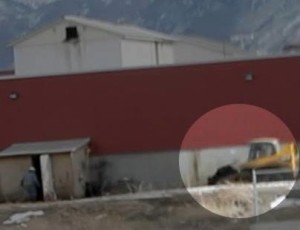 Her hands shook and filming from the street was difficult, but Amy Meyer did her best to record the scene she witnessed: A sick cow being moved by heavy equipment outside of a slaughterhouse.
Her hands shook and filming from the street was difficult, but Amy Meyer did her best to record the scene she witnessed: A sick cow being moved by heavy equipment outside of a slaughterhouse.
“The cow on that bulldozer is alive,” Meyer can be heard saying. Another woman’s voice is frantic: “Oh my God, oh my God.”
As I previously reported, Meyer drove to Dale Smith Meatpacking Company in Draper City, Utah, because she heard that anyone passing by could view the animals, and she wanted to see for herself. She filmed the scene, and was prosecuted for “animal agriculture interference” under Utah’s “ag-gag” law — the first prosecution of its kind in the nation.
Meyer’s video, now published for the first time here, clearly shows that not only was she filming from public property, but she witnessed what appears to be a sick cow — known in the industry as a “downer”– being moved by a track loader outside the slaughterhouse. Video footage of similar treatment led to the largest meat recall in U.S. history after the Humane Society documented that the sick cows were entering the food supply and being fed to children.
In this video, Meyer is filming the bulldozer moving the cow as she stands on the public easement. She is approached by Bret Smith, manager of the meatpacking company (and brother of the town mayor mayor, Darrell H. Smith).
During the exchange, Meyer notes that she is standing on public property, and points to the barbed-wire fence. Under Utah’s ag-gag law, filming an agricultural operation is illegal if you 1) leave a recording device on the property without the owner’s consent, 2) obtain access under false pretenses, or 3) trespass. Meyer violated none of those provisions.
Utah’s law is similar to a dozen other ag-gag bills that have been introduced this year in response to a series of damning undercover investigations by animal protection groups like Mercy For Animals, the Humane Society, and Compassion Over Killing. The investigations have prompted criminal charges and a massive public outcry, but rather than remedy the most egregious animal welfare abuses, the industry is trying to silence the whistleblowers.
Meyer’s exchange with Smith touches on this as well:
Smith: If you have something to ask me about my business then why don’t you have the balls to come and ask me. We are running a legitimate business over there. And you guys have no business recording me from anywhere. That’s my property.
Meyer: Why are you concerned about being filmed if you have no problem, you think this is legitimate business?
Smith: It is a legitimate business.
Meyer: Then why are you concerned about being filmed?
Ironically, Smith angrily says “You cannot videotape my property from public property” as he is using his own smart phone to film Meyer.
When the police arrive, Meyer continues filming.
Police: Taking pictures?
Police: Whatcha taking pictures of?
Meyer: I’ve just never seen what this place looks like.
Police: Did you have a friend with you?
Meyer: Am I correct that this is a public easement?
Police: Yup.
Despite acknowledging that she is on public property, the officer tells her: “I’m investigating criminal activity. I don’t know if you’re a suspect or not.”
Meyer stands her ground, and repeatedly asks if she is being detained, if the officer can show her what law she has violated, and if she can call her attorney.
“I don’t need to answer any of your questions,” she says. “I have done nothing illegal. I am not suspected of anything illegal. I’m on a public easement next to the street… I’m not going to talk to you. I’m done talking with you. When my lawyer calls I’ll let you talk to him.”
The police officer appears a bit flustered, and sheepishly says he will need to check her insurance. He returns to say that she is free to go, but that prosecutors will be “screening charges” to determine if she should be prosecuted.
Charges were later filed. But just 24 hours after I reported the story and it went viral, they were dropped.
The dropped charges were a victory for Meyer, but Utah’s ag-gag law is still on the books.
And right now in North Carolina, a bill is being considered that is even more dangerous. It’s called the “Commerce Protection Act,” and it’s not limited to factory farms or slaughterhouses. It’s an ag-gag bill that applies to all industries, from fracking to Monsanto.
Human Rights Watch has called the bill a threat to worker safety, environmental protections, and consumer health.
And as Amnesty International said, bills like the one in Utah used to prosecute Amy Meyer threaten all of us: “What at first might appear to be exclusively an animal abuse issue is, on closer inspection, clearly also a freedom of expression issue, a workers’ rights issue, an environmental issue and a public health issue.”
Concerned about ag-gag laws? Join the 140,000 others who have signed the petition at Change.org/AgGag
Historic “McLibel” Leaflet Was Co-Created by This Undercover Cop
Bo b Lambert was an undercover cop in who spent years infiltrating Greenpeace and other protest groups in London. He has previously been exposed for bombing a department store in the name of the Animal Liberation Front, and is also under investigation for sexual relationships he had with four women while undercover.
b Lambert was an undercover cop in who spent years infiltrating Greenpeace and other protest groups in London. He has previously been exposed for bombing a department store in the name of the Animal Liberation Front, and is also under investigation for sexual relationships he had with four women while undercover.
Now Paul Lewis and Rob Evans at The Guardian have reported that Lambert, while undercover, co-wrote the infamous leaflet about McDonald’s that led to the “McLibel” trial, the longest court case in English history:
The true identity of one of the authors of the “McLibel leaflet” is Bob Lambert, a police officer who used the alias Bob Robinson in his five years infiltrating the London Greenpeace group, is revealed in a new book about undercover policing of protest, published next week.
McDonald’s famously sued green campaigners over the roughly typed leaflet, in a landmark three-year high court case, that was widely believed to have been a public relations disaster for the corporation. Ultimately the company won a libel battle in which it spent millions on lawyers.
Lambert was deployed by the special demonstration squad (SDS) – a top-secret Metropolitan police unit that targeted political activists between 1968 until 2008, when it was disbanded. He co-wrote the defamatory six-page leaflet in 1986 – and his role in its production has been the subject of an internal Scotland Yard investigation for several months.
At no stage during the civil legal proceedings brought by McDonald’s in the 1990s was it disclosed that a police infiltrator helped author the leaflet.
The response from a police spokesman is particularly salient: “At some point it will fall upon this generation of police leaders to account for the activities of our predecessors, but for the moment we must focus on getting to the truth.”
June 23, 2013
Tennessee Official Says Complaining About Water Quality Could Be an “Act of Terrorism”
 Residents of Maury County, Tennessee, have had problems with water quality, and some say their children have become ill from drinking tap water. After months of complaints to the state, State Rep. Sheila Butt held a forum for residents to voice their concerns. But the response from the Tennessee Department of Environment and Conservation wasn’t what they expected.
Residents of Maury County, Tennessee, have had problems with water quality, and some say their children have become ill from drinking tap water. After months of complaints to the state, State Rep. Sheila Butt held a forum for residents to voice their concerns. But the response from the Tennessee Department of Environment and Conservation wasn’t what they expected.
The deputy director of the department, Sherwin Smith, said that complaints about water quality could be considered an “act of terrorism.”
“We take water quality very seriously. Very, very seriously,” he was recorded saying. “But you need to make sure that when you make water quality complaints you have a basis, because federally, if there’s no water quality issues, that can be considered under Homeland Security an act of terrorism.”
When dumbfounded residents asked him to clarify, he repeated the threat verbatim.
So let’s recap:
If you attend a film screening of Gas Land, and learn how fracking is polluting your water, the Pennsylvania Department of Homeland Security considers you a terrorist.
If you protest how TransCanada’s Keystone XL pipeline would threaten the water and land, the company will push law enforcement to prosecute you as a terrorist.
If you document the environmental threat of factory farms, fracking, and other industries, pending “ag-gag” legislation would make you a criminal.
And now we’re seeing the same language about speaking up at a town hall meeting with state officials?
One has to wonder what kind of message state agencies are trying to send. If even the most innocuous advocacy for the environment and your health is labeled “terrorism,” what reason is there for people to not turn to more extreme tactics?
June 19, 2013
5 Lessons on Repression and Resistance on the 60th Anniversary of the Rosenberg Executions
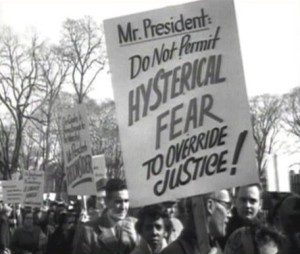 A few days ago, I traveled to New York City for a fundraiser benefitting the Rosenberg Fund for Children, an organization that supports the children of political prisoners and also supports young people who have been targeted because of their activism. I write about these issues every day — and I’m also on the advisory board of the RFC — which often makes me feel numb to what I am witnessing, out of necessity.
A few days ago, I traveled to New York City for a fundraiser benefitting the Rosenberg Fund for Children, an organization that supports the children of political prisoners and also supports young people who have been targeted because of their activism. I write about these issues every day — and I’m also on the advisory board of the RFC — which often makes me feel numb to what I am witnessing, out of necessity.
The event had a timeliness that made those kinds of coping mechanisms impossible. It came just a few days before the 60th anniversary of the U.S. government’s execution of Julius and Ethel Rosenberg, during the height of the Red Scare, and the event took place on Father’s Day. As families across the country gathered together for this holiday, Robert and Michael Meeropol reflected on the murder of their parents, Jenn and Rachel Meeropol reflected on growing up with that legacy, and cast members read letters from children and parents who, at this moment, are separated by prison walls.
As I listened to their words, surrounded by generations of people who have been directly affected by government repression — through McCarthyism, through the movements of the 1960s, and the families of today’s targets — I was overcome. Overcome with a mix of sadness and rage, but also of awe. The people in the room, and the families the RFC benefits, are not “victims” of state repression. They are fighters. For many, they have continued that fight their entire lives, and their children continue in the same struggle.
The most common question I am asked about my work is also the most difficult: How do we respond to government repression? What do we do?
I think we need to answer that question honestly and humbly, because the truth is we don’t know. I don’t know what the right answer is; I don’t know what will win. We have to push forward in the best way we can, with an eye to what has come before us, and how we can learn from the past.
The Rosenberg Fund for Children is a powerful example of how to do that. In that spirit, here are 5 lessons on repression and resistance on the 60th anniversary of the Rosenberg executions:
1) Naming names will not protect you.
The government’s manufactured case against the Rosenberg’s was based on the cooperation of David and Ruth Greenglass, Ethel Rosenberg’s brother and sister-in-law, who were threatened with a similar fate unless they turned on their family.

“We rededicate ourselves to fight our government’s war-making abroad and repression at home. We will not name names. We will not keep quiet. Like Ethel and Julius we believe a better world is possible. We will nurture future generations who will carry it forward and pass it on.”- Angela Davis
They responded by helping corroborate the government’s allegations that the Rosenbergs stole atomic secrets, which was untrue. The Rosenbergs’ execution was possible because others named names out of fear. They weren’t alone. Many others provided information about their friends and colleagues during the Red Scare in the hope that doing so would protect them from the witch hunt. It didn’t work. It only gave more ammunition to the McCarthyists, and ruined more lives.
Robert Meeropol’s parents stood by their beliefs and by each other, and for it they paid the ultimate price. He says he could not be more any more proud of them for their decision, and asked: Could David and Ruth Greenglass’ family say the same?
2) Build alliances and learn from other movements.
It’s easy to pay lip service to this, and toss around words like “solidarity” and “diversity.” Putting it into practice is incredibly difficult. At the RFC benefit, I was struck by how many social movements were represented: black liberation prisoners, Puerto Rican independence prisoners, antiwar prisoners, and many others.
Robert Meeropol has consistently spoken out in support of animal rights activists and environmentalists, even though some more traditional “Old Left” activists have resisted the inclusion. As Meeropol says, they are part of the same struggle:
I know there are RFC supporters who feel that fighting for animal rights is a somewhat trivial pursuit compared to trying to prevent the horrific crimes against humanity carried out by multi-national corporations and the many governments they influence or control. But the behavior against which these activists are organizing is part of the same culture that permeates the military industrial complex, the energy companies, the private prison corporations, and so on. These are the same foes we all face every day. The rights the corporations and their political flunkies seek to curtail belong to us all. And the sensibilities these heroic young militants seek to spread are the same values to which other progressives aspire.
Let’s not look down our noses at a new generation of activists whose causes vary from our own and who are doing things a little differently from what our generation did. Instead, let’s emphasize our points of convergence. We need as much solidarity as we can get in taking on the corporate juggernaut.
3) Don’t turn your back on those seen as “too militant.”
As I document in my Green Is the New Red, politicians and corporate lobbyists sent letters to national environmental groups, pressuring them to condemn “radical” groups and their tactics. If they refused, members of Congress said, they would be investigated as “eco-terrorists” as well.
Many organizations went along with this. Now, years later, some of those same organizations are being called “terrorists” as well.
When people turn their backs on those they feel have been imprisoned for being too militant, it reminds me of my parents’ case. Few alive today remember that A.J. Muste, the pacifist mainstay of the War Resisters’ League, refused to get involved in the effort to save my parents’ lives because they had been accused of aiding the Soviet military. Fellow pacifist, Dave Dellinger, disagreed. He argued that regardless of what my parents might have done, all progressives should stand in solidarity with them because they were being subjected to violent, right-wing political repression.
Dellinger foresaw the long-term negative consequences of the split between leftists and liberals generated by McCarthy-era charges of communist subversion. The military industrial complex took this lesson to heart and has repeatedly driven a wedge between mainstream and militant progressive movements ever since. Those on the Left who turn their backs on Green Scare defendants, fail to see that this round of repression is another iteration of the divide and conquer strategy.
… The successful, big business-driven legislative effort to redefine terrorism as anything that hurts commodities or profits, should set off alarm bells among all people on the Left. This is part of a larger corporate strategy to have law enforcement treat all progressive activism as a form of terrorism.
4) Support political prisoners.
The target of the Rosenberg case was not just Julius and Ethel. It was the broader movement. And the target of today’s political prosecutions and disproportionate sentences are not just people like Bradley Manning, Jeremy Hammond, and Marie Mason: it’s everyone who is paying attention, and can be intimidated into silence and submission.
Standing behind political prisoners doesn’t mean you necessarily support the crimes they have been convicted of, or even that you completely agree with the social movements that they represent. It means that you recognize their politically-motivated prosecution as a tactic of repression intended to instill fear.
“I hope that some day babies won’t be separated from their mothers because of politically motivated persecution,” says Asantewa Sunni-Ali, daughter of Black Panther Fulani Sunni Ali. But in the meantime, prisoner support “helps us understand that even though our families are targeted, and our situations may be difficult, we are not alone.”
5) Carry out “constructive revenge.”
Experiencing government repression, or witnessing others experience it, is traumatic. But too often, we act as if acknowledging pain and fear is a reflection of weakness.
I would argue the opposite. Those emotions are most debilitating when we experience them alone. But when we acknowledge them together, in our communities and in our movements, they can be made into something empowering.
The Rosenberg Fund for Children grew out of that trauma, and is a form of “constructive revenge” by Robert Meeropol against those who murdered his parents The work is vital in and of itself, but it’s also an example of how to carry on histories of resistance.
As Angela Davis, RFC advisory board member, said:
“We rededicate ourselves to fight our government’s war-making abroad and repression at home. We will not name names. We will not keep quiet. Like Ethel and Julius we believe a better world is possible. We will nurture future generations who will carry it forward and pass it on.”
Harper’s Magazine on Ag-Gag
 Harper’s Magazine asked me to submit a letter on ag-gag legislation for the current issue. You can read the letter, along with a response by Temple Grandin and others, at the Harper’s website. Mine is below:
Harper’s Magazine asked me to submit a letter on ag-gag legislation for the current issue. You can read the letter, along with a response by Temple Grandin and others, at the Harper’s website. Mine is below:
It’s telling that the photographs accompanying Ted Conover’s report on working in an industrial slaughterhouse [“The Way of All Flesh,” May] show only living animals and the nearby town. Slaughterhouses are not places we want to see; and, more important, they are not places the meat industry wants us to see. With this fact in mind, state legislators across the country have done the industry’s bidding, introducing bills criminalizing the photographing and video recording of factory farms and slaughterhouses.
“Ag-gag” laws were passed in Iowa, Missouri, and Utah last year. In Nebraska, where Conover worked undercover as a Food Safety and Inspection Service meat inspector, the state legislature is currently debating one. This legislation has a chilling effect on whistle-blowing and on reporting like Conover’s. Last month, prosecutors in Utah charged a woman for filming a slaughterhouse from the side of the road. The charges were eventually dropped, but the law remains on the books. It’s important that activists and journalists — whose work has exposed horrific animal cruelty, led to criminal charges against the industry, and prompted the largest meat recall in U.S. history — be protected from criminal prosecution.
Will Potter
Washington, D.C.
June 12, 2013
TransCanada Is Secretly Briefing Police About Keystone XL Protests and Urging Terrorism Prosecutions
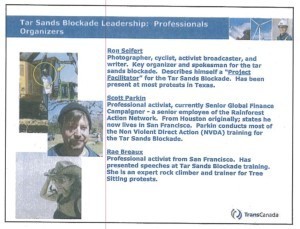 New documents show that TransCanada, the corporation behind the $5.3 billion Keystone XL oil pipeline, has been briefing police about non-violent protesters and urging prosecutors to consider them “terrorists.”
New documents show that TransCanada, the corporation behind the $5.3 billion Keystone XL oil pipeline, has been briefing police about non-violent protesters and urging prosecutors to consider them “terrorists.”
Environmentalists have waged a diverse campaign against the 2,000-mile pipeline that has included civil disobedience at the White House, tree sits and blockades, and a new lawsuit by the Sierra Club saying the U.S. State Department’s environmental review of the Keystone XL is “plagued by conflicts of interest.”
The tactics are working. In response, TransCanada is filing lawsuits across the country in hopes of deterring opposition; in Oklahoma, they recently filed a restraining order against protesters.
New documents show that TransCanada is also working behind the scenes with local police, providing cops with names and photographs of dozens of activists, warning of non-violent tactics, and urging terrorism prosecutions.
A TransCanada PowerPoint presentation was obtained by Bold Nebraska through the Freedom of Information Act. The briefing is dated December 11, 2012, and offers a rare look at how the energy industry giant is trying to silence its opposition.
Activist Dossiers
The presentation includes photographs, names, and background information on ”Tar Sands Blockade Leadership: Professionals [sic] Organizers.”
Ron Seifert is listed as a photographer and cyclist who “has been present at most protests in Texas.”
Scott Parkin is a “professional activist” (a senior campaigner for the Rainforest Action Network, one of the most respected non-profit environmental groups in the country). He also “conducts most of the Non Violent Direct Action training.”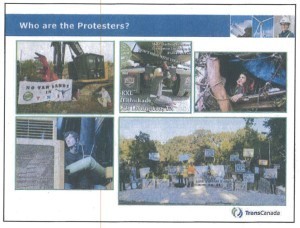
Rae Breaux is an “expert rock climber and trainer for Tree Sitting projects” and “has presented speeches.”
Most of the photos of activists appear to be taken directly from protest websites like Tar Sands Blockade. In other words, activists are not trying to hide their motivations. They are open about who they are, what they are doing, and why they are doing it.
Another slide on activist motivation describes the type of people TransCanada fears. The first quotation says, “I have been an activist for fifty years. I am seventy.”
“They may climb and occupy trees “
What have protesters done that is so troubling to TransCanada that they need to beg law enforcement for assistance?
“They may climb and occupy trees,” TransCanada warns.
In Oklahoma, ”a protester walked in to the lane of a slow moving vehicle.” There has been “no physical violence to this point.”
In Texas, there has been “demonstrations / protest activity,” “tree houses,” “banners,” “social media organization,” and again — no physical violence.
In Nebraska, where this briefing took place, there has been “protest/demonstrations” and “opposition attendance” at public meetings. At the very worst, landowners have allegedly been heard saying they “longed for the days when you could shoot people on your land.” However, there has not been any property destruction in the state, let alone violence.
“Try as TransCanada might to slanderize Tar Sands Blockade and our growing grassroots movement, we know who the real criminals are,” said Ron Seifert, a spokesperson with Tar Sands Blockade who was pictured in the slideshow. “The real criminals are those profiting from this deadly pipeline by endangering families living along the route and pumping illegal levels of air toxins into fence-line communities.”
Terrorism Prosecutions
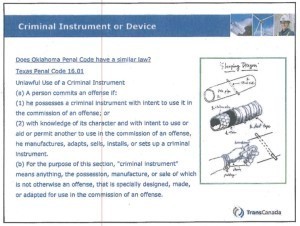 What’s particularly troubling about this presentation is that a corporation is briefing law enforcement about who, when, and why they should prosecute.
What’s particularly troubling about this presentation is that a corporation is briefing law enforcement about who, when, and why they should prosecute.
TransCanada offers police a playbook on how to go after activists. The company suggests prosecuting using criminal trespass, criminal conspiracy, criminal instrument or device (the PVC pipe used for non-violent civil disobedience), grand juries, and “federal/state anti-terrorism statues [sic].”
This isn’t empty rhetoric. In Texas, a terrorism investigation entrapped activists for using similar civil disobedience tactics. And as I reported recently for VICE, Oregon considered legislation to criminalize tree sits.
TransCanada has been using similar tactics in its home country as well (for a detailed look: “7 Ways Canadian Environmental Groups Are Being Attacked as Terrorists”).
In addition to briefing law enforcement, TransCanada is also hiring off-duty cops. In a brazen conflict of interest, local police are being paid extra cash during their off hours by the same corporation that is asking them to arrest protesters while they are on the job.
The Real Threat
One of the final slides of the presentation is particularly revealing in terms of what is at stake here. The list of “Potential Security Concerns” includes
Gulf Coast Project — recent media attention.
Keystone XL — media, high profile.
Environmental Activism.
Energy Action Coalition — “Fossil Fools Day”
Protest, Blockade, Threats, Office occupation
Future open houses, public meetings
Landowner court challenges
Notice the emphasis on media and public exposure? TransCanada is not pleading with law enforcement to crack down on property destruction or violence, because that’s not what this campaign is about. The campaign against the Keystone XL pipeline has resulted in widespread public support, and positive media coverage about people willing to non-violently put their bodies on the line.
That’s why TransCanada has also hired a new PR agent: the corporation says “we have been dwarfed by the content the activists have and are posting online with respect to Keystone XL.” And they say they may hire PR giant SKDKnickerbocker.
Something tells me the first recommendation from a new public relations firm will be “don’t create any more presentations like this.”
June 11, 2013
Listen to this Documentary About Supporting Political Prisoners
Today, June 11th, is an international day of action in support of Eric McDavid, Marie Mason, and longterm anarchist political prisoners. Eric McDavid was sentenced to 20 years in prison after an FBI entrapment campaign, and Marie Mason was sentenced 21 years as a “terrorist” for destroying property.
Those prison sentences are so extreme not because of the nature of the crime — no one was harmed, and they are triple the average sentence for those crimes — but because of the politics of Eric McDavid and Marie Mason.
Check out this new radio documentary by Miranda Gibson and learn more about their cases:
We look at why these two are considered to be political prisoners and the movement of prisoner solidarity around the world. We explore the significance of these cases from a global perspective and talk about June 11th, the international day of solidarity with Eric and Marie.
Featuring: Jeff Luers (former political prisoner), Will Potter (author of Green is the New Red), Jenny (Sacramento Prisoner Support) and Peter (Support Marie Mason).
Credits: Produced by Miranda Gibson. Audio Post Production by Brendan Kays.
Write them:
Marie Mason #04672-061
FMC Carswell
Federal Medical Center
P.O. Box 27137
Fort Worth, TX 76127
Eric McDavid 16209-097
FCI Terminal Island
Federal Correctional Institution
PO Box 3007
San Pedro, CA 90731
June 7, 2013
How the NSA Kept Us From Knowing About a Previous, Illegal Domestic Spy Program in 2006
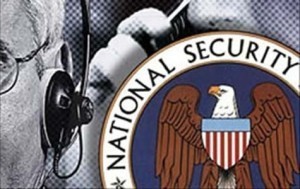 The National Security Agency is engaged in an extensive monitoring of real-time and stored communications of Americans as part of an information-sharing program with Google, Facebook, and other major internet companies. Glenn Greenwald broke the story at The Guardian yesterday based on top-secret documents on a program called PRISM. If you haven’t read his story, or the Washington Post coverage, please do.
The National Security Agency is engaged in an extensive monitoring of real-time and stored communications of Americans as part of an information-sharing program with Google, Facebook, and other major internet companies. Glenn Greenwald broke the story at The Guardian yesterday based on top-secret documents on a program called PRISM. If you haven’t read his story, or the Washington Post coverage, please do.
What we are seeing now–especially news that NSA is collecting Verizon customer information– is strikingly similar to the scandal over illegal spying by the Bush administration. But as Greenwald shows, these operations have not only continued under the Obama administration, they have expanded.
In light of that, I wanted to highlight a little-known story of how the NSA narrowly averted a similar scandal involving illegal spying on protest groups in 2006.
At that time, members of the Earth Liberation Front were going to trial, as terrorists, for their role in a series of arsons. The threat of a life sentence was enough to convince them to snitch on their friends. A few of the defendants refused, though, and were facing even more prison time for not cooperating.
Then the attorneys for these non-cooperating defendants had a brilliant idea. On March 24, 2006, they served prosecutors with a request for all materials obtained through the Foreign Intelligence Surveillance Act (FISA) or the NSA. The Bush administration NSA scandal was international news. And if the NSA was illegally spying on environmentalists, it could have all the cases thrown out of court.
Here’s an excerpt from Green Is the New Red about what happened next:
On August 22nd, after months of government stalling, Judge Ann Aiken holds a hearing on the NSA motion. Prosecutors argue that they have turned over all of the discovery materials in the case, including seventy-two CDs and 28,000 pages of documents. They say no information “in the possession” of the prosecution was obtained illegally. If they ever received materials obtained through warrantless surveillance, they say they had no way of knowing and no security clearance to find out. Attorney Stephen Peifer tells Aiken, “I’ve been working on this case for ten years, and the term FISA has never come up.”
“To you,” Aiken replies. In another case, assistant U.S. attorneys were unaware of NSA spying until the government accidentally disclosed it to defense attorneys for the Al-Haramain Islamic Foundation. Information obtained through warrantless surveillance could have been filtered into the Operation Backfire investigation unbeknownst to prosecutors.
There is only one way to know for sure. In a major victory for the defense, Aiken rules that the government must disclose whether the NSA spied on the defendants.
The ruling does not bode well for the prosecution. A group of constitutional scholars, law professors and former government officials has sent a letter to Congress saying that, although not all details of the spying program have been revealed, it “appears on its face to violate existing law.” The Congressional Research Service, the nonpartisan investigative arm of Congress, has issued a report with similar conclusions. In at least five other lawsuits, courts have forced the government to disclose whether NSA surveillance played any role in the case; on the morning McGowan’s attorney filed the motion, another court ruled that NSA surveillance violated the First Amendment, Fourth Amendment, and the Foreign Intelligence Surveillance Act. “It was never the intent of the Framers to give the president such unfettered control,” Judge Anna Diggs Taylor wrote in ACLU v. NSA, “particularly where his actions blatantly disregard the parameters clearly enumerated in the Bill of Rights.” If NSA surveillance is disclosed in this case, it will likely be ruled unconstitutional. And if it is ruled unconstitutional, then all of the Operation Backfire cases could be dismissed.
But the government could lose more than these cases. The Bush administration has fought hard to keep its spy programs secret. When the Justice Department’s Office of Professional Responsibility began examining the role of government lawyers in the program, President Bush denied security clearances to investigators and shut them down. In an interview with the El Paso Times, National Intelligence Director Mike McConnell stated that to even question government spying threatens American lives. “So you’re saying that the reporting and the debate in Congress means that some Americans are going to die?,” the interviewer said, repeating McConnell’s statement. “That’s what I mean,” he replied. “Because we have made it so public. We used to do these things very differently, but for whatever reason, you know, it’s a democratic process and sunshine’s a good thing.”
If prosecutors hand over new information about the Terrorist Surveillance Program, it could prove suspicions that the government’s spying has extended far beyond Al Qaeda. It could lead to Congressional hearings, much like ones that dissolved SHAMROCK, MINARET, and COINTELPRO. Exposing NSA spying on the animal rights and environmental movements could dismantle the entire domestic spying apparatus, and the Bush administration along with it.
Two months later, Daniel McGowan’s attorney, Amanda Lee, quietly withdraws the NSA motion. Neither she nor Assistant U.S. Attorney Kirk Engdall will offer an explanation other than that it is “by reason of agreement with the government.” A week later, on November 9th, Daniel McGowan, Jonathan Paul, Nathan Block and Joyanna Zacher change their pleas to guilty. The pleas are part of an unusual non-cooperating plea agreement in which they will admit their guilt but not name names.
Neither the government nor defense attorneys will confirm a direct relationship between the withdrawal of the motion and the guilty pleas. But it is clear that both parties had a remarkable change of heart on positions they previously refused to compromise.
From the start prosecutors had said there were two options: snitch and receive a reduced sentence, or go to trial and risk life in prison. McGowan and his attorneys had organized the “non-cooperating defendants” and pushed for a special plea deal, but prosecutors said it was not open for discussion. While this agreement impedes investigation into other ELF crimes, the government avoids a national security investigation.
The defendants had been just as steadfast, saying they would never accept a plea deal. Had they maintained this position, and had the NSA motion revealed illegal surveillance, their cases might have been thrown out. However, those are significant variables with so much at stake. This way, the defendants relinquish any hope of absolution, but they secure reduced sentences.
The defendants’ decision comes with an additional, political sacrifice. For McGowan, who always seems to be thinking about the bigger activist picture, the deal means forfeiting a rare opportunity to expose systemic government corruption. On some activist websites and message boards there are comments questioning the decision to cede the upper hand in a national political scandal. The anonymous individuals leaving comments, however, are not facing life in prison.
June 4, 2013
New York Anarchist Jerry Koch Is in Jail for Refusing to Testify Before Grand Jury

Published on VICE.
A New York anarchist has been jailed for refusing to testify before a federal grand jury about his political beliefs, his friends, and the legal support he provided to Occupy Wall Street.
Gerald “Jerry” Koch, 24, was subpoenaed before a grand jury that is believed to be investigating the 2008 explosion outside a military recruitment center in Times Square. The blast damaged the front door of the center and injured no one, but the FBI began a “terrorism” investigation of local anarchists.
Koch isn’t accused of this crime—or any other crime.Prosecutors told his lawyers that they think he was at a bar in 2008 or 2009, after the bombing, and that someone else at the bar knew about another person who was involved. Koch was subpoenaed to a grand jury in 2009—when he was only 19—and publicly stated that he didn’t know anything about it and wouldn’t cooperate.
On May 21, he appeared before the grand jury again, refused to answer any questions, and remained silent the entire time. More than a hundred supporters yelled out to him as he was taken to jail.
“By the time you read this,” Koch said in a statement released after the hearing, “I will be in the custody of the United States government for continuing my refusal to cooperate with a federal grand jury. This is the right thing to do.”
If the government’s six-degrees-of-separation logic and bar-talk investigation of Koch sounds sketchy, it should: grand juries have been used for decades as pretext for gathering information not necessarily about crimes but about the actions of social movements including the Black Panthers, environmentalists, and antiwar activists.
Grand juries are secretive by nature. Prosecutors won’t even acknowledge if a grand jury exists, let alone say what is being investigated. When you appear before a grand jury, you don’t have the right for your attorney to be present. Nor can you assert your First Amendment and Fifth Amendment rights and refuse to talk about your politics, your friends, or yourself. If you do, you can be held in contempt and thrown in jail until you cooperate. They can keep you there as long as 18 months.
Grand juries are intended as a safeguard of sorts within the court system. They’re meant to determine if the government has enough evidence to move forward with a prosecution. But all of that secrecy and unchecked power lends itself quite well to political fishing expeditions, and that’s what is happening in Koch’s case.
“Jerry was the person everyone could count on to be waiting for them outside of jail, to support them in the courtroom, and to help with their legal defense,” his supporters said in a statement. ”It is clear that the state’s goal is not just to pressure Jerry into informing on the radical community, but to take away someone who is an integral part of our community—someone who makes us all stronger.”
Koch’s imprisonment is the most recent case in a growing crackdown on anarchists and other radicals, and signals an increased use of grand juries against them.
Last year, six anarchists in the Pacific Northwest were subpoenaed to a grand jury investigating vandalism during a May Day protest in Seattle.
Matt Duran and Katherine “KteeO” Olejnik are two of the anarchists who refused to cooperate and were imprisoned. They both spent five months in jail. Two months were spent in solitary confinement, treatment that the Seattle Human Rights Commission called inhumane. Eventually US District Judge Richard A. Jones released them, saying that “their resolve appears to increase as their confinement continues.”
Their resolve was only possible, the resisters say, because of the support they received from anarchists and civil rights advocates around the world. “It can’t be said enough how important prisoner support is,” Olejnik says. “It’s what keeps people strong on the inside. It’s what kept me strong. One letter can make all the difference… They are trying to break you.”
Koch, who has years of experience providing legal aid to activists, is now on the receiving end of prisoner support efforts.
His partner, Amanda Clarke, recalls the 12-hour-days Koch would spend at courthouses, on the phone, and in the streets helping those arrested at Occupy Wall Street protests. In one case, a group of activists were facing multiple felonies and Koch raised thousands of dollars in donations in just a few hours for their release.
“It’s really scary, seeing the government go after one of your friends in this way,” she says. The grand jury and Koch’s imprisonment has instilled fear in radical communities in New York, but she says it has been overshadowed by support and outrage from new allies.
“I overheard someone on the subway talking about Jerry and saying, ‘How can this be the law in our country?’” she says. “That’s exactly it. How can you put someone in prison who is not even charged with anything?”
Write Jerry Koch a letter today:
Gerald Koch #68631-054
MCC NEW YORK
METROPOLITAN CORRECTIONAL CENTER
150 PARK ROW
NEW YORK, NY 10007






